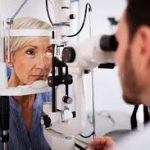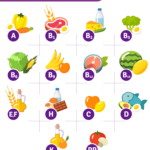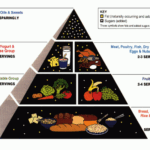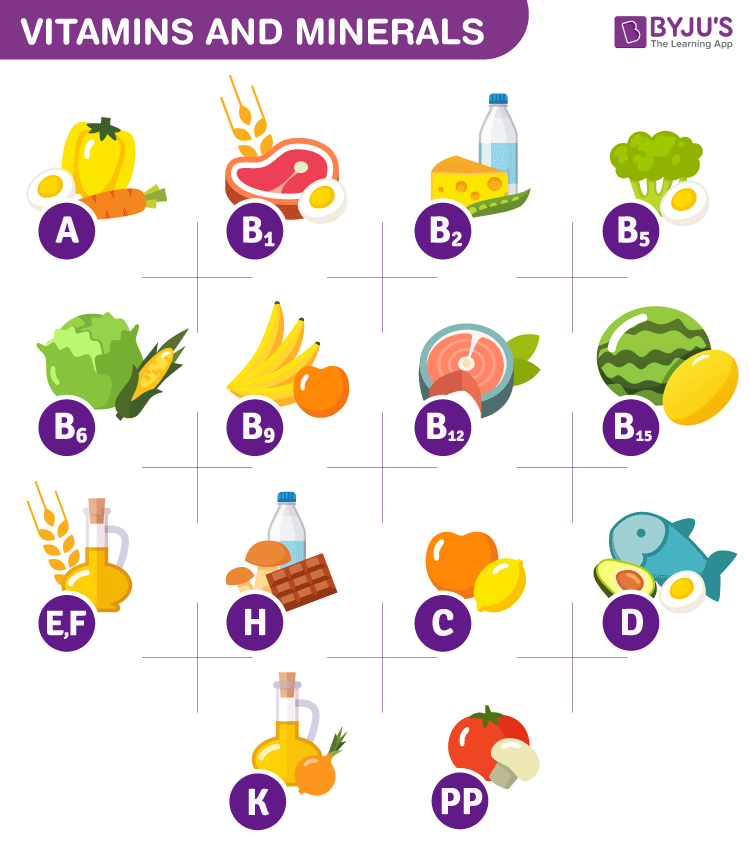All Types of Vitamins and Their Sources
Vitamins are organic substances that are essential in very small quantities for growth, repair and maintenance of good health in humans and animals. They cannot be synthesized by living organisms and must be obtained from the diet.
You can get vitamins from many different foods and even from sunshine. This article looks at the common names, chemical names and sources of the fat-soluble vitamins A, D, E and K and the water-soluble vitamins B and C.
Vitamin A
Vitamin A is a fat-soluble nutrient found in animal products, fortified foods, and vegetable sources. The body uses it to maintain healthy eyes and skin, and to metabolize fats and carbohydrates.
Its two main forms in the diet are preformed retinol (retinyl esters and retinal) and provitamin A carotenoids, such as alpha- and beta-carotene. The human body cannot make retinol, so it needs to come from the diet. Good sources include liver, egg yolks, fatty fish and some vegetables. Supplements are also available.
Vitamin D
Vitamin D is a fat-soluble vitamin that regulates calcium and phosphorus levels in the blood. It is also needed for bone health and may prevent osteoporosis, cancer, cardiovascular disease, depression, multiple sclerosis, and type 2 diabetes.
Vitamin D is produced naturally in the skin by exposure to sunlight, and it is added to some foods. It is also available in supplement form. Many vitamins interact with each other or with other dietary constituents in complex ways. These interactions can be synergistic or antagonistic.
Vitamin E
Vitamin E is a fat-soluble nutrient that protects the cells of your body against oxidative stress. It is found in a wide variety of foods, including vegetable oils, seeds, nuts and some green leafy vegetables, as well as in fortified foods and dietary supplements. It consists of eight different compounds, divided into tocopherols and tocotrienols. The most abundant form is alpha-tocopherol.
The most common forms of vitamin E in the American diet are d-alpha tocopherol and gamma-tocotrienol, with d-alpha-tocopherol meeting the majority of dietary requirements. People with fat-malabsorption disorders should be careful to choose dietary sources that are rich in d-alpha tocopherol.
Vitamin K
Vitamin K is a fat-soluble vitamin that plays an important role in blood clotting. It also helps keep bones strong and reduces the risk of osteoporosis.
The main dietary form of vitamin K, called phylloquinone, comes from plant-based foods. The other, menaquinone, is generated by gut bacteria in the large intestine and is found in animal-based foods and fermented soy products like natto.
In one study, higher intakes of vitamin K2 were associated with a lower risk of coronary heart disease (CHD) and less calcification of the arteries.
Vitamin B1
Vitamin B1, also known as thiamine, is involved in the conversion of carbohydrates to energy. It helps prevent complications of the nervous system, heart and stomach. It is essential for endurance sports such as cycling and long-distance running.
Natural primary animal sources of vitamin B1 include yeast, pork and eggs. It is also found in beans, peas, lentils, whole grains, sunflower seeds and oatmeal. Fortified foods such as flour, bread and breakfast cereals may also contain vitamin B1. Vitamin B1 deficiency can be associated with a nerve disease called polyneuritis.
Vitamin B2
Vitamin B2 or Riboflavin is one of the eight essential water soluble vitamins that help the body convert food into energy. It is necessary for the health of the eyes, ears and lining of the digestive tract and helps the body metabolize fats and protein.
Vitamins are organic substances found in minute amounts in natural foodstuffs. Deficiency of them can cause various diseases. Some are absorbed more easily from animal than plant sources, so the most common source of vitamins is meat and dairy products. Other sources include eggs, whole grains and leafy vegetables.
Vitamin B3
Vitamin B3, also known as niacin, is an essential water-soluble vitamin. It helps the body process fats and lower cholesterol levels. Severe deficiency of this nutrient causes pellagra, which is characterized by scaly skin, dementia, diarrhea and inflammation of the mouth.
Vitamins are nutrients that perform hundreds of jobs in your body to keep you healthy and functioning normally. They help shore up bones, heal wounds and bolster your immune system. They also convert food into fuel and improve circulation. They can also reduce the risk of heart disease and diabetes.
Vitamin B5
Vitamin B5, or pantothenic acid, is one of the 8 water-soluble vitamins in the B complex that help the body produce energy. It also helps the body use fats and protein.
It is important for a variety of functions in the body, such as producing new red blood cells and synthesizing cholesterol and hormones. It also helps to metabolize carbohydrates, proteins, and fats.
It can be found in foods such as beef liver, tuna, pork and chicken. Other sources include brewer’s yeast, peanuts, and vegetables such as mushrooms.
Vitamin B6
The vitamin B6 known as pyridoxine is important in many metabolic functions. It also appears to reduce symptoms of premenstrual syndrome (PMS), such as nausea and vomiting in pregnancy.
It is found in animal and plant foods, including fortified breakfast cereals and nutrition bars. A deficiency of vitamin B6, along with folic acid and vitamin B12, may lead to elevated levels of homocysteine in the blood, which can increase the risk for heart disease. [1]
Vitamin B7
Known as vitamin B7 or biotin, this member of the vitamin family is responsible for converting food into energy. It also promotes the growth of hair and nails, making it a staple in many beauty and health supplements.
The best source of vitamin B7 is found in a variety of wholesome foods. A diet rich in vitamin B7 will help to reduce problems like dandruff, hair fall, and brittle nails. It is also useful in treating skin diseases like seborrheic dermatitis and diabetes. It may also ease kidney issues.







